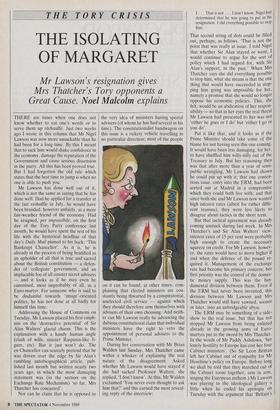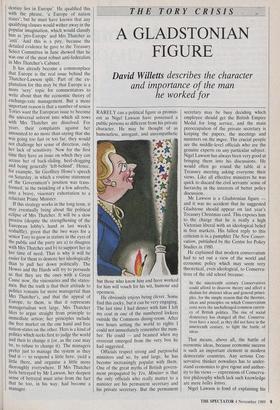THE TORY CRISIS
THE ISOLATING OF MARGARET
Mr Lawson's resignation gives Mrs Thatcher's Tory opponents a
THERE are times when one does not know whether to eat one's words or to serve them up rechauffe. Just two weeks ago I wrote in this column that Mr Nigel Lawson was now more unsackable than he had been for a long time. By this I meant that to sack him would shake confidence in the economy, damage the reputation of the Government and cause serious dissension in the party. All this has been proved true. But I had forgotten the old rule which states that the best time to jump is when no one is able to push you.
Mr Lawson has done well out of it, which is not the same as saying that he has done well. Had he applied for a transfer at the last reshuffle in July, he would have been branded, however unfairly, as a mere fair-weather friend of the economy. Had he resigned, per impossibile, on the first day of the Tory Party conference last month, he would have spent the rest of his life with the hysterical headline of that day's Daily Mail pinned to his back: 'This Bankrupt Chancellor'. As it is, he is already in the process of being beatified as an upholder of all that is true and sacred about the British constitution — a defen- der of 'collegiate' government, and an implacable foe of all sinister secret advisers — and it looks as if he may even be canonised, most improbably of all, as a Euro-martyr. For someone who is said to be disdainful towards 'image'-oriented politics, he has not done at all badly for himself this time.
Addressing the House of Commons on Tuesday, Mr Lawson placed his first emph- asis on the 'destructive potential' of Sir Alan Walters' glacial charm. This is the explanation with a handy human angle (clash of wills, sinister Rasputin-like fi- gure, etc). But it just won't do. The ex-Chancellor can scarcely pretend that he was driven over the edge by Sir Alan's rambling autobiographical article, pub- lished last month but written nearly two years ago, in which the most damaging statement was (in the section on the Exchange Rate Mechanism) 'so far, Mrs Thatcher has concurred'.
Nor can he claim that he is opposed to
the very idea of ministers having special advisers (of whom he has had several in his time). The constitutionalist bandwagon on this issue is a rickety vehicle travelling in no particular direction; most of the people on it can be found, at other times, com- plaining that elected ministers are con- stantly being thwarted by a conspiratorial, unelected civil service — against which they should therefore arm themselves with advisers of their own choosing. And neith- er can Mr Lawson really be advancing the dubious constitutional claim that individual ministers have the right to veto the appointment of personal advisers to the Prime Minister.
During her conversation with Mr Brian Walden last Sunday, Mrs Thatcher came within a whisker of explaining the real nature of the disagreement. Asked whether Mr Lawson would have stayed if she had sacked Professor Walters, she replied, 'I don't know'. At this, Mr Walden exclaimed 'You never even thought to ask him that?' and this earned the most reveal- ing reply of the interview:
I I. . . That is not . . . I don't know. Nigel had determined that he was going to put in his resignation. I did everything possible to stop him.
That second string of dots could be filled out, perhaps, as follows. 'That is not the point that was really at issue. I told Nigel that whether Sir Alan stayed or went, I would continue to argue for the sort of policy which I had argued for, with Sir Alan's support, in the past.' When Mrs Thatcher says she did everything possible to stop him, what she means is that the one thing that would have succeeded in stop- ping him going was impossible for her, namely a promise that she would no longer oppose his economic policies. This, she felt, would be an abdication of her respon- sibility — so that in her eyes the real threat Mr Lawson had presented to her was not `either he goes or I do' but 'either I go or you do'.
Put it like that, and it looks as if the Prime Minister should take some of the blame for not having seen this one coming. It would have been less damaging, for her, to have shuffled him willy-nilly out of the Treasury in July. But her reasoning then was that after more than a year of semi- public wrangling, Mr Lawson had shown he could put up with it; that one conten- tious issue, entry into the ERM, had been sorted out at Madrid in a compromise which they could both live with; and that since both she and Mr Lawson now wanted high interest rates (albeit for rather diffe- rent reasons), they were less likely to disagree about tactics in the short term.
But that tactical agreement was already coming unstuck during last week. In Mrs Thatcher's and Sir Alan Walters' view, interest rates of 15 per cent were probably high enough to create the necessary squeeze on credit. For Mr Lawson, howev- er, the rates would have to move higher if and when the defence of the pound re- quired it. Management of the exchange rate had become his primary concern; her first priority was the control of the domes- tic money supply. This was the fun- damental division between them. Even if the ERM had never been invented, this division between Mr Lawson and Mrs Thatcher would still have yawned, sooner or later, into an unbridgeable abyss.
The ERM may be something of a side- show to the real issue, but that has not stopped Mr Lawson from being enlisted already in the growing army of Euro- martyrs put to the sword by Mrs Thatcher. In the words of Mr Paddy Ashdown, 'her lonely hostility to Europe has cost her four Cabinet ministers'. (So Sir Leon Brittan left her Cabinet out of sympathy for Mr Heseltine's policy on Europe. Before long we shall be told that they marched out of the Cabinet room together, arm in arm, singing the European anthem.) Mr Lawson was playing to the ideological gallery a little when he ended his apologia 00 Tuesday with the argument that 'Britain's
destiny lies in Europe'. He qualified this with the phrase, 'a Europe of nation states'; but he must have known that any qualifying clauses would wither away in the popular imagination, which would classify him as 'pro-Europe' and Mrs Thatcher as `anti'. And this is a pity, because the detailed evidence he gave to the Treasury Select Committee in June showed that he was one of the most robust anti-federalists in Mrs Thatcher's Cabinet.
It has already become a commonplace that Europe is the real issue behind the Thatcher-Lawson split. Part of the ex- planation for this may be that Europe is a more 'sexy' topic for commentators to write about than the economic theory of exchange-rate management. But a more important reason is that a number of senior Tories want the European issue to become the universal solvent into which all rows with Mrs Thatcher are dissolved. For years, their complaints against her amounted to no more than saying that she was going too fast or too far; they would not challenge her sense of direction, only her lack of sensitivity. Now for the first time they have an issue on which they can accuse her of back-sliding, heel-dragging and being generally 'left-behind'. Hence, for example, Sir Geoffrey Howe's speech on Saturday, in which a routine statement of the Government's position was trans- formed, in the twinkling of a few adverbs, Into a brave, visionary exhortation to a reluctant Prime Minister.
If this strategy works in the long term, it may eventually bring about the political eclipse of Mrs Thatcher. It will be a slow process (despite the strengthening of the European lobby's hand in last week's reshuffle), given that the two ways for a senior Tory to grow in stature in the eyes of the public and the party are a) to disagree with Mrs Thatcher and b) to support her in her time of need. That is why it will be easier for them to demote her ideologically than to pull her down politically. The Howes and the Hurds will try to persuade us that they are the ones with a Great Cause now, the visionaries and the states- men. But the truth is that their attitude to politics remains far more managerial than Mrs Thatcher's, and that the appeal of Europe, to them, is that it represents managerialism writ large. Mrs Thatcher likes to argue straight from principle to immediate action; her principles include the free market on the one hand and free nation-states on the other. Hers is a kind of politics which•seeks first to judge the world and then to change it (or, as the case may be, to refuse to change it). The managers prefer just to manage the system as they find it — to respond a little here, yield a little there, and organise a little more thoroughly everywhere. If Mrs Thatcher feels betrayed by Mr Lawson, her deepest sense of betrayal must arise from the fact that he too, in his way, had become a manager.

















































 Previous page
Previous page